Glitz, warmth light up Star gala evening
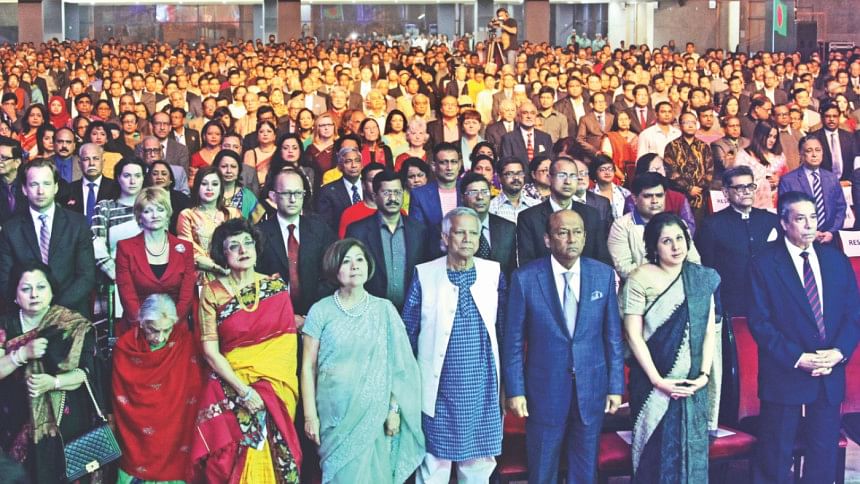
The Daily Star yesterday celebrated its 25th anniversary amid much fanfare and with a renewed resolve to better contribute to the democratic and socioeconomic development of the country.
The daily, which began its journey on January 14, 1991, after the restoration of democracy, has set an example of ethical and bold journalism not only in Bangladesh, but across Asia, said eminent personalities speaking on the occasion.
Around 4,000 people -- politicians, academics, businessmen, diplomats, journalists and development workers from home and abroad -- joined the grand reception under the banner “25 Years of Journalism without Fear or Favour” at the International Convention City Bashundhara in the capital in the evening.
The programme began shortly after 7:00pm with the screening of a documentary on the brief history of the birth of Bangladesh, its struggles throughout the journey and achievements in the economy and the social sector.
Then came a group of 25 eminent artistes of the country who rendered two songs -- aguner poroshmoni chhoaw prane and joy houk joy houk shantir joy houk shammer joy houk -- igniting the inner spirit of democracy, peace and justice.
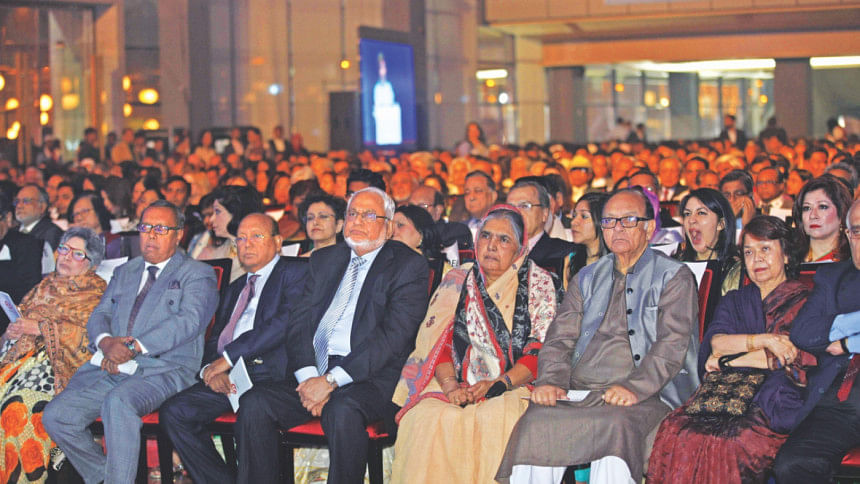
Speaking on the occasion, eminent Indian journalist Kuldip Nayar said The Daily Star “is a child of liberation of Bangladesh”.
Nayar, who covered Bangladesh's 1971 war, added that he found the ethos of Bangladesh's liberation in the largest circulated English daily in Bangladesh.
N Ram, publisher of The Hindu Group of Publications, India, said: “The Daily Star is a respected daily, and the reason is it maintains the core values of journalism -- truthfulness, freedom, independence and social good.”
It is a big achievement made despite many challenges faced, he noted.
Pichai Chuensuksawadi, editor-in-chief of Bangkok Post, said The Daily Star had been playing an important role in promoting development.
“Do the best for your nation in the next 25 years,” he said.
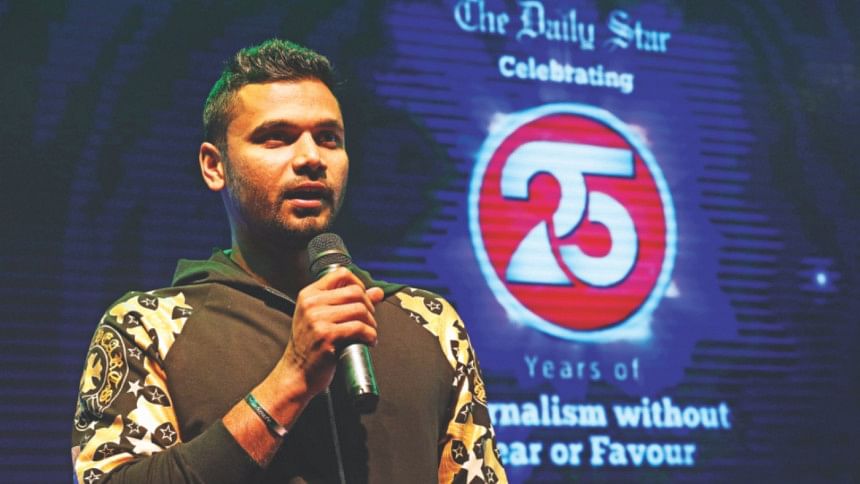
Torben Stephan, director at the Konrad-Adenauer-Stiftung Media Programme Asia, Singapore, suggested that the newspaper should continue with the ethos of democratic values and bring in new generation of journalists committed to truth.
Veena Sikri, convener of South Asia Women's Network, said not only in Bangladesh, readers outside also read The Daily Star for credible information, something that is worth praising.
Rokia Afzal Rahman, chairperson of Mediaworld Ltd, the owning company of The Daily Star, said that people and their welfare were at the centre of the newspaper.
She saluted the role of farmers, migrant workers, women, NGOs and the private sector for their immense contribution to the development of the country, which now stood tall in the international arena.
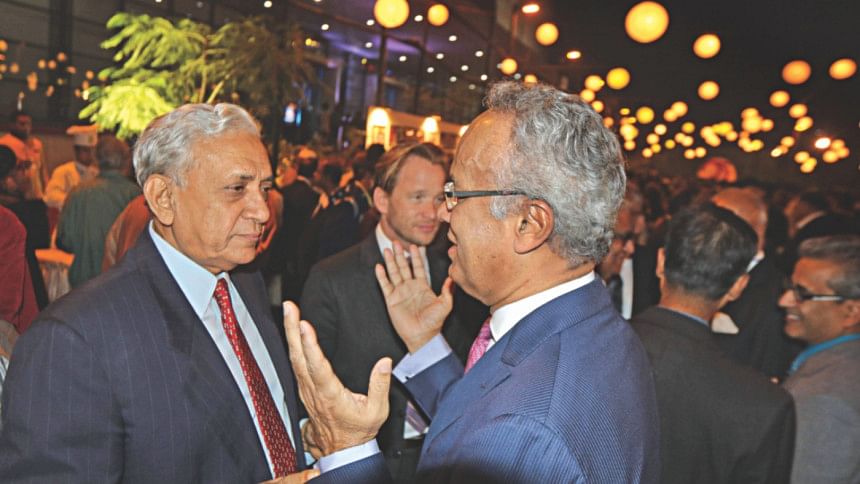
Migrant workers contribute to the major share of the country's foreign reserve, while farmers through their hard work have tripled rice production in the last 40 years.
Women are increasingly getting involved in economic activities on the one hand and NGOs and the private sector are making laudable contribution to the country's socioeconomic development on the other, she added.
“Bangladesh is now enjoying demographic dividend. Some 70 percent of our people are aged between 18 and 40. They can turn our economy.
“Youths are the change-makers. Be bold, courageous and unstoppable,” Rokia Afzal said.
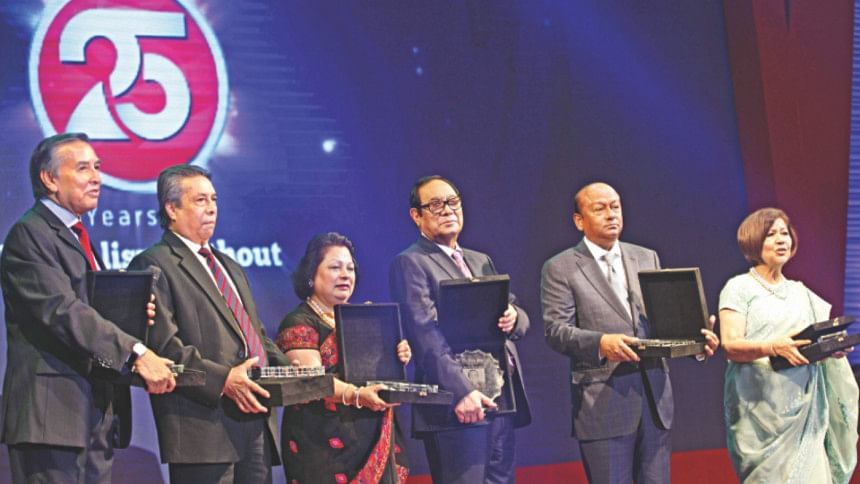
Also, Bangladesh's big strength is its geographical position. Being located by two big economic giants -- India and China -- the country can make the best use of the advantage by providing shipping services across the region, she added.
She recalled the significant roles of the paper's founding editor SM Ali, founding chairman Azimur Rahman, founding managing director of the Mediaworld AS Mahmud and founding managing editor Taufique Aziz Khan.
Mahfuz Anam, editor and publisher of The Daily Star, lauded the role of the paper's board of directors, saying it never influenced the editorial policy of the newspaper, a fact that made the daily independent.
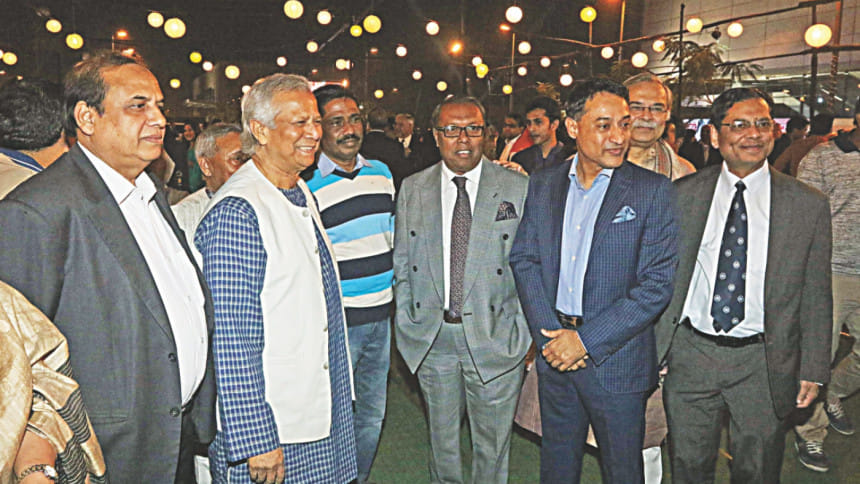
Other members of the board include Shahnaz Rahman, Rouf Chowdhury, Latifur Rahman and Shamsur Rahman.
Addressing the guests, Anam said that in the past newspapers were more of a family business, but The Daily Star was the first paper launched with a corporate structure.
Professor Dr Muhammad Yunus delivered The Daily Star Silver Jubilee Lecture.
Among the attendees who came from abroad were: Irene Z Khan, director general of the International Development Law Organisation, Italy, Raj Chengappa, editorial director of India Today Group, Jaideep Bose, editorial director of Times of India, KN Tilak Kumar, editor-in-chief of Deccan Herald in India, Amitabha Datta, director of Calcutta Media Institute, Suthichai Yoon, chief adviser to the Editorial & Management Board of the Nation Multimedia Group of Thailand, Pana Janviroj, president of The Nation in Thailand, Thailand's TV programme producer Jirayut Topiyabutra, Philippines Daily Inquirer Editor-in-Chief John Nery, Myanmar's Eleven Media Group Managing Director Dr Thein Myint, the Kathmandu Post Editor Akhilesh Upadhyay, Nepali Times Editor and Publisher Kunda Dixit and Pakistan's GEO TV Executive Editor Hamid Mir.
Commerce Minister Tofail Ahmed, Agriculture Minister Matia Chowdhury, Roads and Bridges Minister Obaidul Quader, Education Minister Nurul Islam Nahid, Prime Minister's International Affairs Advisor Gowher Rizvi, Economic Adviser Moshiur Rahman, Information Adviser Iqbal Sobhan Chowdhury, Forest and Environment Minister Anwar Hossain Manju, Civil Aviation and Tourism Minister Rashed Khan Menon also graced the occasion.
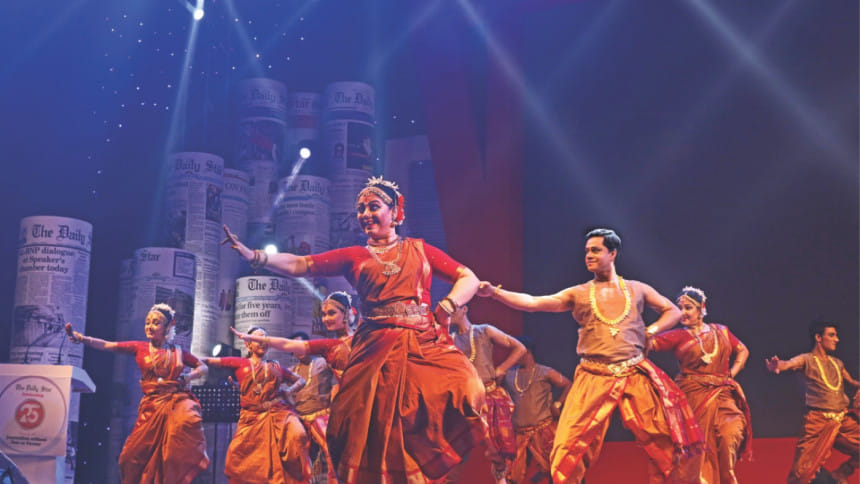
Among politicians who attended the Silver Jubilee are Awami League leaders Nooh ul Alam Lenin, Colonel (retd) Faruk Khan, Abdur Razzaque, Hasan Mahmood, Khalid Mahmud Chowdhury, Captain (retd) Tajul Islam, Abdur Rahman, Dhaka South City Corporation Mayor Sayeed Khokon, Jatiya Party leaders HM Ershad, Ruhul Amin Hawlader, Ziauddin Bablu, GM Quader, CPB President Mojahidul Islam Selim, Gono Forum President Dr Kamal Hossain, BNP leaders Fakhrul Islam Alamgir, Lt Gen (retd) Mahbubur Rahman, Moeen Khan, Selima Rahman, Asaduzzaman Ripan, Rizvi Ahmed, Zainul Abdin Farroque and Emran Saleh Prince.
Rights activists Sultana Kamal, Hamida Hossain, Rasheda K Chowdhury and Sara Hossain, Prothom Alo Editor Matiur Rahman, Kaler Kantho Editor Imdadul Haque Milon, Bangladesh Protidin Editor Nayeem Nizam, Bhorer Kagoj Editor Shaymol Dutt, Dhaka Tribune Editor Zafar Sobhan, media personalities Faridur Reza Sagar, Shykh Seraj, Munni Shah and Mozammel Babu; Dr Samanta Lal Sen, barristers M Amir-Ul Islam and Rokanuddin Mahmud, magician Jewel Aitch and actor Hasan Imam were also present.
Diplomats of foreign missions, including of the US, France, UK, European Union, Russia, and the UN agencies; Leading businessmen AK Azad, Siddiqur Rahman, Abdullah Al Mahmud Mahin, A Gafur, Masud Rahman and Fazlur Rahman and economist Mustafizur Rahman were also there.
International Crimes Tribunal's prosecutors Rana Dasgupta, Zead Al Malum, Hrishikesh Saha and Sultan Mahmud Simon and tribunal's investigation agency's coordinator Abdul Hannan Khan, Joint Commissioner (crime) of Dhaka Metropolitan Police Krishna Pada Roy and Rab's director (legal and media wing) Mufti Mahmud Khan also attended the programme.

 For all latest news, follow The Daily Star's Google News channel.
For all latest news, follow The Daily Star's Google News channel. 

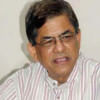






Comments